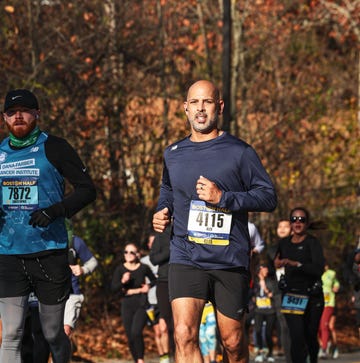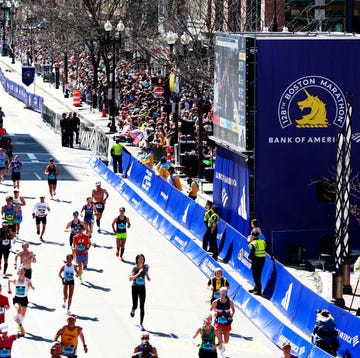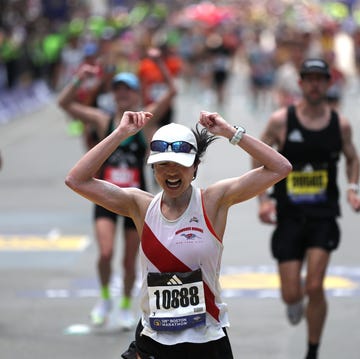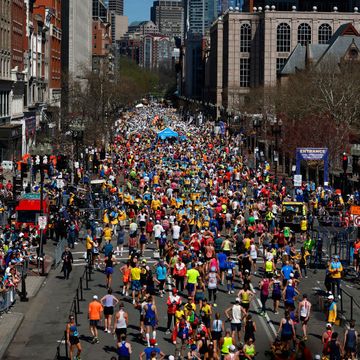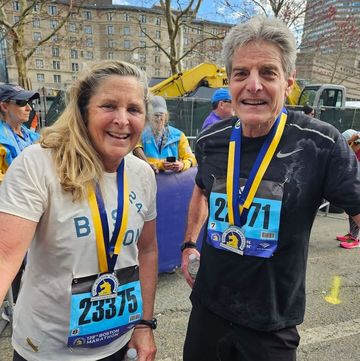We may earn commission from links on this page, but we only recommend products we back Shalane Flanagan. Growing up on a shore town north of Boston and the daughter of two accomplished marathoners, she became fascinated by the Boston Marathon before she became obsessed with running.
Now the former Marblehead High School star turned Olympic medalist is making a Patriots’ Day homecoming that includes running the 117th Boston Marathon. She knows enough race lore to realize the last American winner was Lisa (Weidenbach) Rainsberger in 1985. Flanagan, who won a bronze medal in the 2008 Beijing Olympics in the 10,000, has made no secret of her desire to win the race in her Boston debut and fourth effort at 26.2 miles.
“If I were to win, it would be my career,” says the woman who has set U.S. records in the 5000 and 10,000. “To me it would define what I’ve done – everything else would be really nice. This would be the focal point. If you were to ask me what I really want in the remaining years of my career, it’s a win in Boston.
“It’s a full-circle moment for me. I was a little girl and watched all these athletes and runners pour into my city of Boston. At that point, I couldn’t run one mile as fast as they were running a whole marathon. It completely blew my mind that someone could do that.”
Now Flanagan, 31, who is based in Portland, Oregon, and did much of her build-up in Colorado Springs, Colorado, returns as a favorite. She and training partner Kara Goucher, both of whom are coached by Jerry Schumacher, are the top American contenders in a typically strong international field.
“To know that I’ve come back to a moment when I’m participating and am a legitimate contender is really kind of surreal to think about,” Flanagan says. “To think I was once on the sidelines and obviously got inspired by it. Ultimately that’s what it’s all about.
“I’m in the business of inspiration, hopefully. I hope to be an inspiration to my city, to my state and the New England area. It’s really a moment of giving back what I was given – all the support and coaching shown by the people who dedicated their time to me. This is a big thank you for helping me find my passion.”
The local girl has made good winning U.S. titles outdoors, indoors, on the roads and in cross country at distances from 3000 meters to the marathon. She has pulled out all stops to win in Boston, but with a twist.
Over the years, she has learned enough about herself and the marathon to realize that less can be more. Her peak weeks for Boston have been about 115 miles compared to 125 previously.
“I’m training more like 95% rather than 100% and relying on that last 5% being my competitiveness and my talents to get me through,” Flanagan says.
That is music to ears of Schumacher, who has had to rein her in rather than gear her up. He has been coaching her since 2009, changing her from a low-mileage track runner to a marathoner, and thinks the years of increasing mileage are about to pay dividends in the marathon.
“She’s got this desire to be great at what she’s doing,” Schumacher says. “That will sometimes drive her in various practices to push harder than necessary. I’d much rather have that than the exact opposite of someone who doesn’t want to work.”
Flanagan has sought advice about preparing for the downhill-uphill-downhill course from Goucher, who has a third and a fifth at Boston; Joan Samuelson, who won Boston in 1979 and ’83; and her father, Steve Flanagan, a 2:18 marathoner. (Cheryl Treworgy, Flanagan’s mother, ran a world best 2:49:40 in 1971.) In December, Flanagan covered the course in runs on consecutive days.
“My quads were beat up just from jogging it,” she says. “To me that’s a sign my quads are going to be trashed after this marathon. Having watched my dad run it, I remember him crawling down the stairs backwards, so I know it’s a tough course.”
Schumacher and Flanagan have tweaked training to customize it for Boston. Flanagan has done some 20-milers that dropped in elevation from 7,000 feet to 6,000, simulating the net downhill of the Boston course. She has been working on quad strength by doing more squats in weight training.
The training has produced some impressive race results. On February 2, she won the U.S. cross country title at 8-K; on February 24, she set a personal best 1:08:31 in finishing second to Ethiopia’s Meseret Defar in the New Orleans Half Marathon; on March 29, she won the Stanford Invitational 10,000 in 31:04.85, off her U.S. record of 30:22.22 but impressive because it came during a marathon buildup.
“The 10-K was basically a five-mile tempo and then she squeezed it a little the last mile to simulate the feeling at the end of a race,” Schumacher says. “She ran the 10-K and half in a very similar style. She just had good control, good command of the entire race.”
The half-marathon PR is telling because of the effort compared to her previous best of 1:08:36, set in 2010. “The time is nice and it’s always nice to PR at this age,” Flanagan says. “But it’s more than what the time says. When I ran my previous PR, it was like an all-out sprint effort. I felt miserable. I almost wanted to step off the course.
“This time I was in such control of my body and how I executed it. If Jerry had said to me, ‘Run another 10 miles at pace,’ I genuinely felt I could have kept going beyond the finish line. So maybe I saved a little too much. For where I was with training, I just wanted to execute a really solid race and that’s what came out. I’m really pleased because I’m fitter now than I was then.”
The race is reassuring for what Flanagan knows is ahead for Boston. “It’s a good place [mentally] to be, knowing I could slow down by almost 10 seconds per mile. I ran like 5:16 mile pace for that PR. Just think if I run 5:25, how glorious that will feel. That excited me to know this marathon prep feels good. The comparison [between the two half-marathons] is night and day. From when I ran the previous PR ’til now, I’m a different athlete.”
If Flanagan averages 5:25 per mile, it will bring her home in about 2:22; her PR from her three previous marathons is 2:25:36 in winning the 2012 Olympic Trials.
Her competition in Boston includes defending champion Sharon Cherop of Kenya and three Ethiopians who have run 2:21. Not that Flanagan is hung up on marathon times, but she knows there are several runners in the field with better PRs.
“Gut instinct is how I like to operate in races,” she says. “I don’t worry about a time. I do feel you have to train to a certain level to be competitive. I have to be in relative good shape, so I have to be in about 2:22 shape in my mind to be able to compete with that. Whether or not I run it on the day or not, we will find out. I’m prepared to compete at that level.”
Flanagan has learned from her previous marathons: 2nd in New York City (2:28:40) in 2010, the Trials PR and 10th at the 2012 London Olympics (2:25:51). She has become more concerned with nutrition and has consulted with experts at Gatorade, one of her sponsors, about the topic.
“We really emphasize it,” Flanagan says. “This has been a huge undertaking and I’m grateful to Gatorade. A lot of marathoners don’t put the time aside and experiment what works for them. But nutrition can really change performance right then and there. It prevents the wall, the bonking.”
Flanagan experienced what she calls “heartbreak” in the London Games, fading from fifth to 10th in the last couple of miles.
“It took me all fall to recover; it was like a really bad breakup,” she says. “I felt pretty devastated. It was devastating to watch all those positions slip away. In one sense, I don’t regret anything because I feel like all the training wasn’t in vain. If anything, it’s going to help me for this marathon.
“I’m very proud of how I attacked the race. I didn’t sit back on my laurels. I felt this is the moment, you go for it. In every aspect of the preparation and the race, I went for it every single time.”
She’s dialed things down a bit for Boston: “I’ve learned not to overextend myself because I’m highly motivated and I want to do a lot of work. Hopefully doing a little bit less will yield better results.”
As if Flanagan won’t have enough emotion running in her hometown area and favorite race, she’ll have as further inspiration the presence of her younger sister, Maggie, an ultramarathoner and former Peace Corps volunteer, in the field.
“It’s a big moment knowing I’ll be sharing the marathon course with my sister,” Shalane says. “She’s extremely talented. Growing up, my dad would always say, ‘You know your sister is better than you are. She just doesn’t care.’ I was always very humbled.
“She’s a mini me, about a half inch shorter. We look almost identical physically. Facially we’re a little different but you can tell we’re sisters. We have the same genetics. I just happen to be the crazy, wired one who loves to compete. She’s more the social butterfly who wants to heal the world.”
The family plans a large party the day after the race in Marblehead with lots of relatives and friends. The homecoming might also turn into a victory celebration.
“It’s going to be overall a memorable weekend,” Flanagan says.
In the video below, Flanagan and Goucher discuss the upcoming Boston Marathon.



